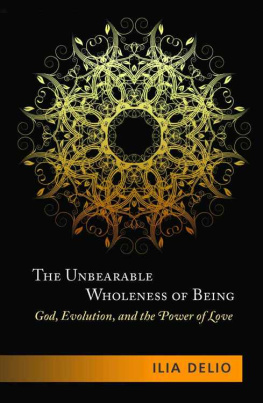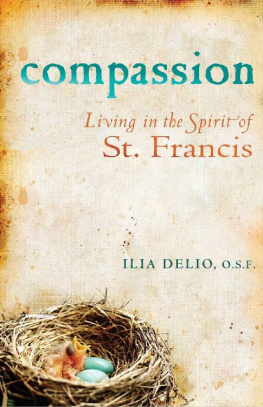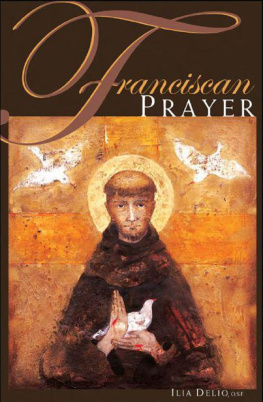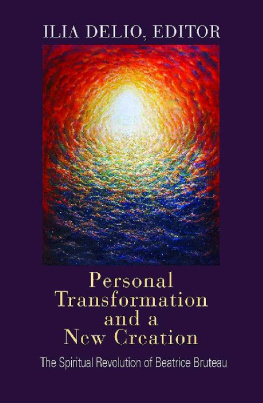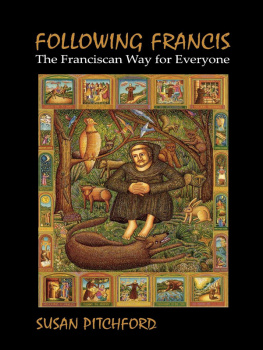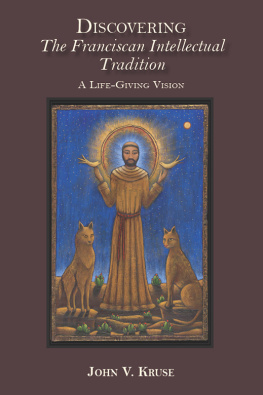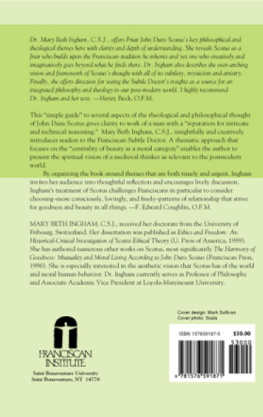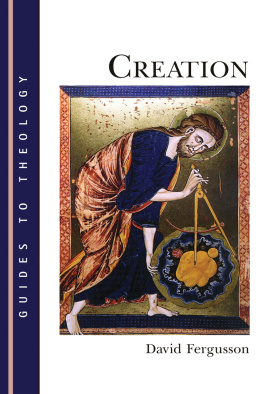
The Franciscan Institute
St. Bonaventure University
St. Bonaventure, NY 14778
2003
This pamphlet is the second in
The Franciscan Heritage Series
sponsored by the
Commission on the Franciscan Intellectual Tradition
of the English-speaking Conference of the
Order of Friars Minor
(CFIT/ESC-OFM)
General Editor
Joseph P. Chinnici, O.F.M.
Assistant Editor
Elise Saggau, O.S.F.
ISBN
1-57659-201-4
Library of Congress Control Number
2003106067
Printed and bound in the United States of America
BookMasters, Inc.
Mansfield, Ohio
TABLE OF CONTENTS
O n behalf of the Commission for the Retrieval of the Franciscan Intellectual Tradition (CFIT), I present to you with great pleasure this second volume of The Franciscan Heritage SeriesA Franciscan View of Creation by Ilia Delio, O.S.F. The purpose of this volume, building on the general introduction established in our first publication, is to elucidate in greater detail the theology of creation as a foundational starting point for contemporary belief and practice. The centrality in our faith tradition of the relationship between the Creator and all of creation and the reflection of the Trinitys glory in everything that is, so fundamental to the spiritual vision of Francis and Clare, is now undergoing a renaissance in our twenty-first-century world. The present volume provides a fine stimulus for further reflection on this most important area.
Dr. Ilia Delio, O.S.F., a member of the Franciscan Servants of the Holy Child Jesus, North Plainfield, New Jersey, is presently at Washington Theological Union (WTU), Washington, D.C., serving as an assistant professor of ecclesial history and Franciscan studies. She is a member of CFIT and director of the Franciscan Center at WTU, where she coordinates an annual symposium on Franciscan theology. A recognized scholar on the thought of St. Bonaventure, Dr. Delio here traces the theme of God and creation from the time of the conversion of Francis through the first century of Franciscan life and thought which culminated in the work of John Duns Scotus.
It is our hope that readers will take this short work and, with careful and thoughtful study, perhaps under the guidance of a mentor, begin to plumb the spiritual depths of our inheritance and comprehend the important uniqueness of its intellectual expression. Through reflection, prayer, conversation and action may we also explore these theological themes as they might be expressed in preaching, pastoral practice, the works of evangelization and community formation with friars, sisters and laity.
This present work takes its place within the context of a much larger Franciscan Heritage Series, which we hope will encompass topics such as the Iconography of the Crucified, Christian Anthropology, Ecclesiology, Scriptural Themes, Evangelization, History, moral decision making, the Natural Sciences, the Arts and other areas of contemporary concern. As further volumes develop, we hope also to include some of the many different carriers of our Franciscan Traditionnot just Francis and the cleric theologians, but also Clare, the women penitents and the laity.
Before our readers begin to enjoy the music of creation as it flows forth from the fullness of a Triune God, however, we must briefly indicate, in this Introduction, the origins of the Heritage Series, its relationship to a major initiative in the English-speaking world, and its connections with some significant trajectories in the social and ecclesial experience of the brothers and sisters of the thirteenth-century foundational period of the Franciscan family.
The Franciscan Intellectual Tradition Project
In March 2001, the English-speaking Conference, Order of Friars Minor, undertook an initiative for the contemporary retrieval of the Franciscan Intellectual Tradition. Composed of the leaders of the provinces and other entities of England, Ireland, Canada and the United States, the Conference established an inter-obediential commission to facilitate the coordination and networking of various publications and popular initiatives that were already taking place throughout the English-speaking world in the various countries which were represented. As one its first initiatives, this Commission for the Retrieval of the Franciscan Intellectual Tradition (CFIT) composed and published a strategic five-year plan, the purpose of which has been detailed in the General Editors Introduction to Volume One of this Heritage Series. (See Kenan Osborne, OFM, The Franciscan Intellectual Tradition: Tracing Its Origins and Identifying Its Central Components, [St. Bonaventure, NY: The Franciscan Institute, 2003], vi-viii).
The Commission decided very early that one of its first major tasks would be to identify the central themes and emphases of the Franciscan Intellectual Tradition, particularly as that was embodied in key theological issues. We decided to begin on the theological level as we felt that the Tradition first took on its specific contours in this area and that theological reflection might provide the clearest orientation for our contemporary mission in Church and society. The Commission also recognized, however, that the Franciscan Tradition is rich in insights as to how the Christian message might intersect with the fields of politics, economics, psychology, sociology and environmental studies. Its own work would simply be complementing many other initiatives being undertaken in the wider Franciscan family, for example, among the many colleges and universities working to mainstream their inherited Franciscan charism.
After an initial theological synthesis that was published along with the Strategic Plan in a booklet entitled The Franciscan Intellectual Tradition Project (June 2001, available from the Franciscan Institute, St. Bonaventure, New York), two significant initiatives were immediately undertaken. The first was the publication of the proceedings of the annual symposium on Franciscan theology at the Washington Theological Union. This gathering is designed to interface, at a high scholarly level, the major theological themes of the Tradition with contemporary issues. Two publications represent the first efforts to make these insightful reflections available: The Franciscan Intellectual Tradition (St. Bonaventure, NY: The Franciscan Institute, 2002) and Franciscan Identity and Postmodern Culture (St. Bonaventure, NY: The Franciscan Institute, 2003). Subsequent volumes will address Creation, the Church, and Biblical Foundations.
The development and publication of a series of pamphlets entitled The Franciscan Heritage Series is the second major initiative. This Series has a different audience in mind and is pitched at a level different from the Washington Theological Union symposia essays. The Heritage Series is designed to make available to college teachers, preachers, formation directors, pastoral workers, and lay persons associated with the Franciscan movement some of the basic themes dominant in our Intellectual Tradition. The character of these offerings is less academic. While they presuppose some training in philosophy and theology, they try, as much as possible, to keep scholarly references to a minimum and to avoid the technical language associated with medieval scholasticism. Although each is complete in itself, no one volume is fully expository. In the long run, we hope that the compilation of multiple volumes will enable the lively student to grasp the Intellectual Tradition in its totality.
The Second Volume
In this context, the purpose of this second volume in the Series is threefold :
(1) To elaborate on the fundamental theme of The Sacred Book Called Creation as that was identified in the first volume in this Heritage Series by Kenan B. Osborne,
Next page

